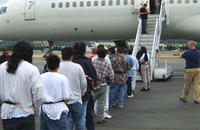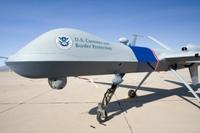-
Thousands of undocumented immigrants see court hearings delayed to 2019 or later
Thousands of undocumented immigrants seeking legalization through the U.S. court system have had their hearings canceled, and may have to wait until 2019 or later before an immigration judge hears their case. The surge in cancellations began late last summer when the Justice Department prioritized the roughly 60,000 Central American immigrants, specifically women and children, who crossed the U.S.-Mexico border.
-
-
In U-Visa limbo: Undocumented immigrants who are victims of crimes
Many immigrants who are victims of crimes, along with their close family members, remain at risk and are denied the opportunity to live and work in the United States as long as Congress fails to increase the number of U-visaswhich immigration authorities can grant per year. Congress established the program in 2000 as part of the Victims of Trafficking and Violence Protection Actto provide an incentive for immigrant victims to report crimes to law enforcement without fear of deportation. Applicants must allege that they have been the victim of a serious crime and provide a certification form signed by law enforcement confirming the applicant’s help or potential help in investigating the crime. USCIS, which processes the applications in the order they were received, has not evaluated any applications submitted after December 2013.
-
-
Lawmakers want more security features to be added to Visa Waiver Program
The recent attacks in Paris have led U.S. lawmakers to propose restrictions on, or adding more security to, the U.S. Visa Waiver Program(VWP), which allows citizens from thirty-eight countries to travel to the United States for up to ninety days without obtaining a traditional visa. Concerns now revolve around the threat that some of the roughly 3,000 European nationals who have traveled to Syria to fight alongside Islamic extremist groups, and are now equipped with skills to launch an attack, may return to Europe and then book a flight to the United States to launch an attack.
-
-
House delays vote on “the toughest border security bill ever”
The House was supposed to vote on Wednsday on what Republicans have called “the toughest border security bill ever,” but the bill encountered harsh criticism from different sides of the GOP caucus. Some complained the measure does not address the pressing issue of immigration reform, while others complained it was the first step on slippery slope toward such reform. The border security bill, Secure Our Borders First Act (H.R. 399), sponsored by House Homeland Security Chairman Michael McCaul (R-Texas), would impose harsh penalties for federal agencies that fail to meet certain requirements. One mandate aims for DHS to achieve “operational control,” or prevent illegal entry across the southern border, within five years. If DHS fails to achieve that objective, political appointees at the agency would be prohibited from traveling in government vehicles, receive reimbursement for nonessential travel, or receive pay increases or bonuses.
-
-
Saudi Arabia constructing 600-mile wall along its border with Iraq
Saudi Arabia has been busy since September busy building a 600-mile East-to-West barrier which will run along its Northern border with Iraq.The primary purpose of the wall is to keep out Islamic State (ISIS) militants who have claimed that their goals are the eventual takeover of the holy cities of Mecca and Medinia, which lie well inside of Saudi Arabia’s borders.
-
-
Visa Waiver program scrutinized in wake of Paris terror attacks
Following the deadly terror attacks in Paris last week, there has been a renewed criticism of the U.S. visa waiver program which has allowed travel without visa by many. The program is now subject to second thoughts by some and questions whether, as currently constituted, it may expose the United States to unjustified risks. “The visa waiver program is the Achilles’ heel of America,” said one critic, Senator Diane Feinstein (D-California).
-
-
Tomsheck’s “July Amnesty”: CBP IA loses hundreds of cases alleging criminal activity by CBP Employees -- Pt. 3
An unprecedented scandal continues to unfold within Customs and Border Protection (CBP). Fueling this scandal are allegations by James F. Tomsheck about the U.S. largest federal law enforcement agency. Further investigation suggests that the “July Amnesty,” initiated in Tomsheck’s CBP IA’s Integrity Programs Division (IPD) headed by Director Janine Corrado and Assistant Director Jeffrey Matta, casts doubt on Tomsheck’s allegations against his CBP superiors. Along with the July Amnesty in 2011 and the alleged discrimination and firing of Navy Lieutenant Commander (Ret.) J. Gregory Richardson in March 2014, there appear to be a number of other events calling Tomsheck’s leadership at CBP IA into question.
-
-
DHS IG questions value of CBP’s border drone program
DHS’s 8-years-old drone program, now consisting of nine drones operating in Arizona, Texas, and North Dakota, has been unsuccessful, according to a just-released DHS inspector general report. Customs and Border Patrol(CBP) expected 23,000 total flight hours per year, but it only logged about 5,100 in fiscal year 2013. The inspector general’s report notes that drones helped in less than 2 percent of apprehensions of illegal immigrants.CBP has used the dronesto cover just 170 miles of the U.S. border – and a 2014 GAO report noted that a fifth of CBP drone flights were conducted within the interior of the United States and beyond the 100-mile range of operations of CBP jurisdiction points.
-
-
Obama’s immigration executive order fuels a resurgence of armed border groups
The last few years have seen the influence of armed border militias, such as the Minuteman Project, on immigration matters, diminish. A combination of dwindling financial resources, bad publicity, and anti-immigration measures passed by conservative legislatures in border states caused the influence of these groups on the immigration debate to decline, as was their ability to sustain a presence along the Southwest border. President Barack Obama’s recent executive order to provide work permits to roughly five million undocumented immigrants who have been in the country illegally for years, has caused a resurgence of border groups.
-
-
Kenya’s harsh new security laws put hundreds of thousands of refugees at risk
Kenya has passed a controversial amendment to the country’s existing security laws, days after heated debates led to brawling on the floor of the Kenyan Parliament. Despite the fracas, the bill was passed with only minor changes, to the dismay of observers at home and abroad. Domestic and international attention has mainly focused on the impact the bill would have on the period of detention without charge, the tapping of communications without court consent, the erosion of media freedom and the limitations placed upon the right to protest. But the world has paid less attention to the severe implications the new amendments have for refugees in Africa’s second-largest refugee-hosting country.
-
-
CBP IA’s Janine Corrado and Jeffrey M. Matta leave agency for new positions
Janine Corrado and Jeffrey M. Matta are leaving CBP IA to assume other positions outside of CBP IA.Corradowill receive a promotion to the position of Chief of Staff for Gregory Marshall, Chief Security Officer at DHS. Matta will take a position in the Office of Field Operations at CBP. J. Gregory Richardson, who worked at CBP IA, complained that Corrado and Matta ignored his status as a disabled veteran despite extensive documentation of his medical condition.
-
-
James F. Tomscheck forced disabled veteran from CBP IA – Pt. 2

While the details and implications of President Barack Obama’s immigration reforms continue to be closely scrutinized, an unprecedented scandal unfolds within the federal agency charged with providing security and control at our Mexican border. Customs and Border Patrol (CBP), a law enforcement agency of 65,000 employees, is potentially facing alarming charges fostered by its former assistant director of Customs and Border Protection Internal Affairs (CBP IA), James F. Tomscheck. Tomscheck, who turned federal whistleblower last summer, lambasted his superiors with multiple accusations. Allegations, however, have arisen against Tomscheck that he knowingly discriminated against a disabled military veteran within CBP IA, then fired him.
-
-
Number of unaccompanied children crossing into U.S. declines sharply

The number of unaccompanied children apprehended by federal agents along the U.S.-Mexico border last October was down by 40 percent compared with October 2013. In the nine sectors of the Southwest border from California to Texas, federal border officials apprehended 2,529 children last October, down from 4,181 in October 2013. Family apprehensions also decreased about 10 percent — from 2,414 in October 2013 to 2,163 in October 2014.
-
-
Immigration advocates say CBP uses "expedited removal" to deport asylum seekers

A new complaint to the DHS Office of Civil Rights and Civil Liberties charge sthat U.S. Customs and Border Protection(CBP) agents routinely ignore asylum seekers’ claim of fear of prosecution in their homeland, a claim which could grant them asylum in the United States. The complaint further states that CBP officers are increasingly using “expedited removal” to deport illegal immigrants. Unlike conventional deportation, expedited removal occurs outside of the judicial process. The number of expedited removal orders more than doubled in less than a decade from 72,911 in 2005 to 193,092 in 2013.
-
-
Drones watch over U.S. borders

Since 2000, the number of Border Patrol agents on the 1,954-mile U.S.-Mexico border has more than doubled, to surpass 18,000, and fencing has increased nine times — to 700 miles. Some members of Congress and border state lawmakers are calling for more border agents and more fencing, but the Obama administration is looking to drones to help reduce the number of illegal immigrants and drugs entering the United States, while simultaneously shifting resources and agents to parts of the border where illegal activity is highest.
-
- All
- Regional
- Water
- Biometrics
- Borders/Immig
- Business
- Cybersecurity
- Detection
- Disasters
- Government
- Infrastructure
- International
- Public health
- Public Safety
- Communication interoperabillity
- Emergency services
- Emergency medical services
- Fire
- First response
- IEDs
- Law Enforcement
- Law Enforcement Technology
- Military technology
- Nonlethal weapons
- Nuclear weapons
- Personal protection equipment
- Police
- Notification /alert systems
- Situational awareness
- Weapons systems
- Sci-Tech
- Sector Reports
- Surveillance
- Transportation
Advertising & Marketing: advertise@newswirepubs.com
Editorial: editor@newswirepubs.com
General: info@newswirepubs.com
2010-2011 © News Wire Publications, LLC News Wire Publications, LLC
220 Old Country Road | Suite 200 | Mineola | New York | 11501
Permissions and Policies
Editorial: editor@newswirepubs.com
General: info@newswirepubs.com
2010-2011 © News Wire Publications, LLC News Wire Publications, LLC
220 Old Country Road | Suite 200 | Mineola | New York | 11501
Permissions and Policies
